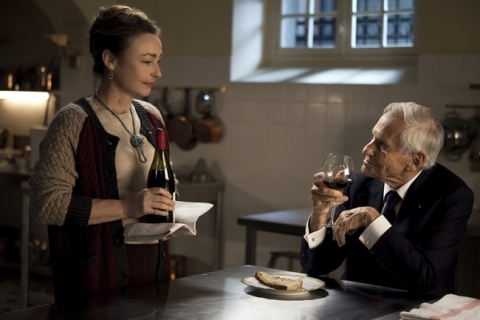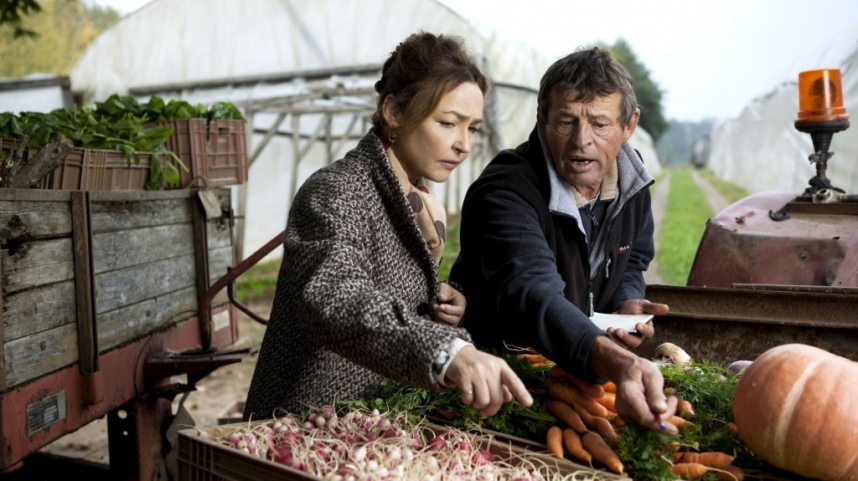Les Saveurs du palais (also known as Haute Cuisine)
Directed by Christian Vincent
Written by Étienne Comar, Christian Vincent
France, 2012
It is somewhat surprising to realize that so few films have been made which concerned themselves with the topic of food. Apart from being an essential element conducive towards human survival, food is in many respects an important side to a community’s culture. It can look and taste great, but also express certain values and beliefs. Of course, there are many films that have food in them, but few are genuinely about food and how it influences, inspires and swings moods. A beautiful example is the 1996 film, Big Night, with Tony Shalhoub and Stanley Tucci. Whatever the case may be, it is always pleasant news when a new release has food as its principle subject matter, for it can influence the story and its characters in so many ways, not mention the fact that when the topic is food, there is typically plenty of it in the film and who would complain about that?. French filmmaker and screenwriter Christian Vincent brings forth his latest, Les Saveurs du palais.
Hortense Laborie (Catherine Frot) is a highly respected and sought after chef of wonderful French cuisine. Oddly enough, as the film opens, she is stationed in Antarctica of all places, functioning as the lead chef for what looks to be a French scientific base of some sort. A small crew of two Australian documentarians have arrived and hope to grab an interview with Hortense, although this proves difficult as the latter wants to have nothing to do with their project. The film’s timeline then shifts back four years when Hortense was still living in the picturesque French countryside. She is called upon by the famous Élysée palace for one of the most significant job opportunities of her life: personal chef to the president himself, François Miterrand (Jean d’Ormesson). While at first she is unsure as to how to approach the challenge, she eventually warms up to the new surroundings as well as her right hand man, master pastry maker Nicolas (Arthur Bauvois). Even the president himself takes a liking to her mouth watering dishes. All good things come to an end though, and when the bureaucrats who handle the government’s finances have their say, life at the Élysée takes a turn for the worse.
Based on that plot synopsis alone, it is tempting to guess that Christian Vincent’s Les Saveurs du palais is the sort of feel good comedy about a clever protagonist who overcomes the odds in a fish out of water story audiences have seen many times already. That is essentially where the film just might surprise viewers given how it deliberately takes some different routes to tell its story. More to the point, the movie performs several nice tricks in order to develop its story and shape the protagonist. One such trick is in the framing device. The decision to begin the film in Antarctica, only to go back in time to when Hortense worked for the president will leave most to believe the Antarctica scenes exist primarily as bookends. Such is not the case in that the director continuously shifts the setting between the present and the past, juxtaposing two of Hortense’s different lifestyles in such a way that instead of feeling too on the nose or cumbersome, a clear portrait of a refreshingly complex character emerges. After attaining as much professional success as one is led to suppose (she is the sole choice of the president of the French republic himself to cook his food after all!), a certain snobbishness has gained her. Clearly she knows what she is doing when in the kitchen, yet let it be known that it will be her way or the highway when it comes to the ingredients and cooking methods. She does soften up a little bit the more she gets to know Nicolas and the president, although she remains staunchly proud and convinced of the importance of her work in the face of penny pinching bureaucrats who wish to reign in the costs. Her time in Antarctica, in a world dominated by men and where the living conditions are considerably harsher, has made her calmer and more at ease with her place in life, with a new found appreciation for treating people with some respect. In neither of these two segments is Hortense perfect, which is part of the pleasure of watching the film. She is flawed yet admirable.
Another surprise is the decision to never allow the relationship between Hortense and the president grow too cute. In the hands of any other screenwriter or director the temptation to concoct some lovable ‘aw shucks’ moments between the two could be too great to miss. Les Saveurs du palais wisely avoids that path, building a connection based solely on food. The president is a great admirer of cook books and can share a smart opinion or two on how to prepare certain dishes. Their bond is straddles the line between professional and friendly yet prevents itself from going too deep into the latter. Both Catherine Frot and Jean d’Ormesson are charming in their respective roles and have some great chemistry together. Frot in particular, who gives a particularly engaging performance, has quite the knack for balancing pomposity with grace.
Finally, the film’s final stretch when Hortense’s one year contract in Antarctica comes to an end, balances mixed emotions quite nicely. The point of the story, judging by how Hortense comes to terms with the stage she is at in her life, can be understood to be that as long as one stays true to what they know and love the most, there is always reason to stay optimistic. Thankfully, the movie does not engage in didacticism, preferring rather to let whatever messages it might have to evolve out of the circumstances in the narrative, playing its cards with subtlety.
Les Saveurs du palais is not a complicated film on paper. Supported by some fine performances and Christian Vincent’s sure handed guidance, it nevertheless takes some interesting chances which pay dividends for the most part. Nothing that will rock the foundations of cinema itself, but a well rounded, tasty dish overall.
*Sound on Sight had the privilege of attending the Montreal press screening particularly early for this movie. Its Montreal premier will be next February 19th for the Montréal en Lumière festivities. Its theatrical release is set for shortly thereafter on March 1st of next year.
-Edgar Chaput



